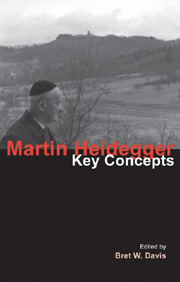Book contents
- Frontmatter
- Contents
- Contributors
- Acknowledgements
- Abbreviations
- Introduction: key concepts in Heidegger's thinking of being
- 1 Hermeneutics of facticity
- 2 Phenomenology: Heidegger after Husserl and the Greeks
- 3 Dasein as being-in-the-world
- 4 Care and authenticity
- 5 Being and time
- 6 The turn
- 7 Heidegger, National Socialism and the German People
- 8 Truth as alētheia and the clearing of beyng
- 9 The work of art
- 10 Ereignis: the event of appropriation
- 11 The history of being
- 12 Will and Gelassenheit
- 13 Ge-stell: enframing as the essence of technology
- 14 Language and poetry
- 15 The fourfold
- 16 Ontotheology and the question of god(s)
- 17 Heidegger on Christianity and divinity: a chronological compendium
- Chronology of Heidegger's life
- Bibliography
- Index
17 - Heidegger on Christianity and divinity: a chronological compendium
- Frontmatter
- Contents
- Contributors
- Acknowledgements
- Abbreviations
- Introduction: key concepts in Heidegger's thinking of being
- 1 Hermeneutics of facticity
- 2 Phenomenology: Heidegger after Husserl and the Greeks
- 3 Dasein as being-in-the-world
- 4 Care and authenticity
- 5 Being and time
- 6 The turn
- 7 Heidegger, National Socialism and the German People
- 8 Truth as alētheia and the clearing of beyng
- 9 The work of art
- 10 Ereignis: the event of appropriation
- 11 The history of being
- 12 Will and Gelassenheit
- 13 Ge-stell: enframing as the essence of technology
- 14 Language and poetry
- 15 The fourfold
- 16 Ontotheology and the question of god(s)
- 17 Heidegger on Christianity and divinity: a chronological compendium
- Chronology of Heidegger's life
- Bibliography
- Index
Summary
Heidegger's relation to Christianity and his ideas about divinity are among the most difficult – and, for many, among the most thoughtprovoking – issues that his readers confront. In fact, these were among the most difficult issues Heidegger personally grappled with, calling “the struggle with the faith of my birth” one of “the two great thorns in my flesh” (the other being his political misadventure; see Ott 1993: 37). This struggle was an ongoing one: over the course of his life Heidegger's thinking underwent significant developments and a number of shifts regarding Christianity, and the Gottesfrage (question of God) can be seen as a periodically resurfacing accompaniment to the Seinsfrage (question of being) along his entire path of thought.
In compiling this compendium my aim was to glean from the pages of Heidegger's many texts a chronologically ordered selection of passages that exemplify the different phases in the development of Heidegger's thinking about Christianity and divinity. In rough outline, those phases can be described as follows:
Up until around 1917 Heidegger exhibits a deep personal faith in Catholicism and a philosophical commitment to Aristotelian-Thomistic scholasticism, which he seeks to defend against “modernism” but also to develop in light of modern logic and medieval mysticism.
Between 1917 and 1919 Heidegger undergoes a religious-philosophical conversion from “the system of Catholicism” to a non-dogmatic Protestantism or “free Christianity”. Inspired by Paul, Augustine, Luther and Kierkegaard, in 1920–21 he seeks to employ phenomenology to recover an experiential understanding of “primal Christianity”.…
- Type
- Chapter
- Information
- Martin HeideggerKey Concepts, pp. 231 - 259Publisher: Acumen PublishingPrint publication year: 2009



